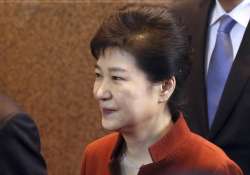Facing protests and investigation, South Korean President allows Parliament to choose her Prime Minister
South Korea’s president said Tuesday that she will allow the Parliament to choose her Prime Minister, a major political concession to growing anger as she scrambles to defuse an escalating influence-peddling scandal.

South Korea’s president said Tuesday that she will allow the Parliament to choose her Prime Minister, a major political concession to growing anger as she scrambles to defuse an escalating influence-peddling scandal.
The announcement by Park Geun-hye, who has faced tens of thousands of protesters and an investigation into whether a mysterious confidante manipulated government decisions, could severely curtail her ability to govern in the 15 months she has left in her term.
Park’s decision, which came during a meeting Tuesday with National Assembly Speaker Chung Sye-kyun, means that the liberal candidate for prime minister who she nominated last week as a way to settle growing anger will apparently be replaced.
However, opposition and ruling party lawmakers must first agree on someone else.
The political tug-of-war over the prime minister, who is typically chosen by the president as a No. 2, comes as opposition lawmakers demand that Park distance herself from domestic affairs because of the scandal involving Park’s longtime confidante, Choi Soon-sil, who has no official government role.
Park already faces terrible approval ratings and calls from the public to step down.
On the other hand, her decision could seriously hurt, or even destroy, her ability to govern.
Just being forced to work with a deputy named by opposition lawmakers — previously a decision left up to the president — would weaken her ability to make basic decisions and influence power in parliament.
But lawmakers, who must still settle on a prime minister nominee, are demanding even more. Some opposition members want the president to divorce herself from all domestic affairs and focus only on foreign matters, while others want her to stay out of government completely.
These scenarios would destroy Park's authority as president during her last 15 months in office, forcing her to voluntarily yield large parts, or maybe even all, of her presidential powers to a prime minister named by an opposition-controlled parliament.
Even so, it is still unclear what a splintered parliament will decide on, or when — or what Park will agree to. Park's ruling party is divided between those who support Park and those who don't, and the opposition, while having more members than the ruling party, is also split into factions.
The political tug-of-war over the prime minister comes amid a scandal involving Park's longtime confidante, Choi Soon-sil, who has no official government role. Investigators are looking into whether Choi made major government decisions and used her relationship with Park to force companies to donate money to two foundations controlled by her.
Earlier Tuesday, South Korean prosecutors raided the Seoul office of Samsung Electronics, the nation's largest and most valuable company, in connection with the scandal.
(With AP inputs)